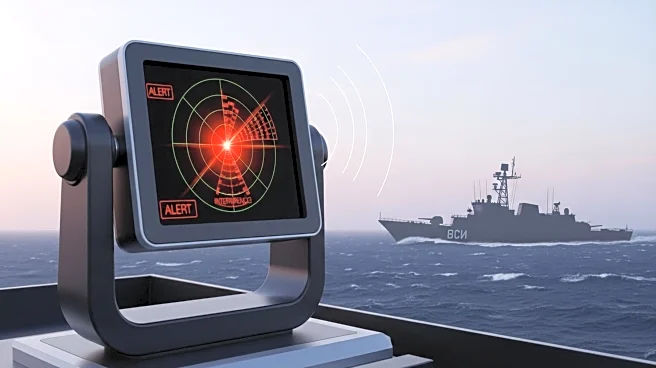What is the story about?
What's Happening?
Denmark's defense intelligence service has reported repeated provocations by Russian naval forces in the Danish straits, a critical international shipping route connecting the Baltic Sea to the North Sea. These provocations include Russian warships sailing on collision courses with Danish vessels, aiming weapons at them, and using sonar and jamming equipment, which has likely caused GPS signal interference. The incidents are part of broader hybrid threats, including drone incursions over Danish airports and military installations, which Prime Minister Mette Frederiksen described as a 'hybrid attack.' Denmark has increased its military budget and committed to acquiring long-range precision weapons in response to these threats.
Why It's Important?
The reported Russian naval activities in the Danish straits highlight ongoing tensions between Russia and Western nations, particularly in the Baltic region. These provocations risk unintended escalation and underscore the strategic importance of the straits for international shipping and regional security. Denmark's response, including military budget increases and weapon acquisitions, reflects the seriousness of the threat. The situation also impacts NATO operations, with increased surveillance and defense measures in the Baltic Sea. The broader implications include potential disruptions to shipping routes and heightened geopolitical tensions, affecting regional stability and international relations.
What's Next?
Investigations into the identity of the perpetrators of the drone incursions are ongoing, with no conclusions yet. NATO has strengthened its operations in the Baltic region in response to these threats, and Sweden has proposed new legislation to expand maritime surveillance. The situation may lead to further military and diplomatic responses from Denmark and its allies, as they seek to address the hybrid threats posed by Russia. Continued monitoring and strategic planning will be essential to prevent escalation and ensure regional security.
Beyond the Headlines
The incidents in the Danish straits reflect broader geopolitical dynamics, including Russia's use of hybrid warfare tactics to exert pressure on Western nations without engaging in direct armed conflict. These tactics include disinformation, espionage, and cyberattacks, which have been flagged as increasingly aggressive by Western security agencies. The situation raises ethical and legal questions about international maritime conduct and the use of military force in non-traditional ways. Long-term shifts may include changes in international shipping routes and increased military presence in strategic areas.















